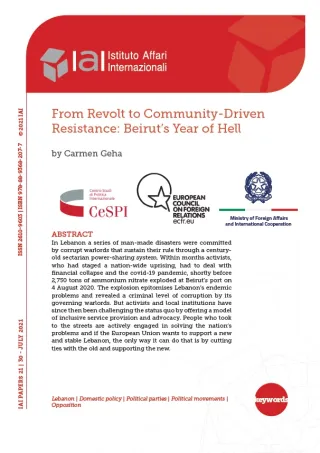Titolo completo
From Revolt to Community-Driven Resistance: Beirut's Year of Hell
In Lebanon a series of man-made disasters were committed by corrupt warlords that sustain their rule through a century-old sectarian power-sharing system. Within months activists, who had staged a nation-wide uprising, had to deal with financial collapse and the covid-19 pandemic, shortly before 2,750 tons of ammonium nitrate exploded at Beirut’s port on 4 August 2020. The explosion epitomises Lebanon’s endemic problems and revealed a criminal level of corruption by its governing warlords. But activists and local institutions have since then been challenging the status quo by offering a model of inclusive service provision and advocacy. People who took to the streets are actively engaged in solving the nation’s problems and if the European Union wants to support a new and stable Lebanon, the only way it can do that is by cutting ties with the old and supporting the new.
Introduction
1. Hell explained: Sectarian warlords and the politics of exclusion
2. From protests to revolution: Three major waves
3. The explosion and its aftermath: Community-driven resistance
Conclusion: A call to action
References


